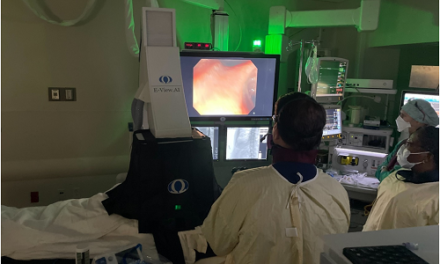 Fluorescent lights are common in clinics and hospitals, but because they contain mercury, they require uncommon disposal methods. The Vapor Vacuum Lamp Compactor, by PestWest Environmental, is designed to help companies deal with fluorescent lamp and high-intensity discharge (HID) lights in a cost-effective, environmentally safe way.
Fluorescent lights are common in clinics and hospitals, but because they contain mercury, they require uncommon disposal methods. The Vapor Vacuum Lamp Compactor, by PestWest Environmental, is designed to help companies deal with fluorescent lamp and high-intensity discharge (HID) lights in a cost-effective, environmentally safe way.
Consolidating fluorescent lamps and storing them in a contained system is key. When fluorescent and HID lamps are broken, toxins are released into the atmosphere, which can be a danger to employees and patients. In fact, fluorescent lamp waste causes more mercury contamination of the environment than any other consumer product. The Lamp Compactor crushes lamps and bulbs while extracting the mercury.
PestWest manufactures top quality insect light traps that control flying insects throughout any healthcare facility. “These traps contain fluorescent lamps that need to be disposed of in a proper manner,” explained Edward J. Domanico, a technical consultant for PestWest and senior certified hazardous materials manager. “We have created a system that is convenient, effective, and significantly cuts disposal costs.”
The Lamp Compactor can crush straight or U-shaped fluorescent lamps as well as HID bulbs that are used to light parking lots and other large areas. “The unique high-pressure negative vacuum system captures the mercury in its five-stage filtering process,” said Domanico. “This device complies with all United States, OSHA and European clean air emission standards. When the device is full, PestWest can arrange for a local pick up, and safely dispose of the waste.”
Companies who do not crush their fluorescent or HID lights are charged by the foot for disposal or take part in a box-recycling program provided by waste collection companies. They can be fined up to $25,000 if these lights are not disposed of properly. Even more important, improper disposal of these lights can cause extensive damage to the environment; just one gram of mercury can contaminate a 20-acre lake.
Employee and patient health are also important concerns since short-term exposure to mercury can cause lung damage, elevated blood pressure and heart rate, and long-term exposure can permanently damage the brain, kidneys and developing fetuses.
Though some businesses, like manufacturing facilities and commercial sign companies, take advantage of the lamp compactor, Domanico says that many other industries are not aware that this new technology is available. “It not only cuts their disposal costs in half, but also makes good environmental sense,” he said.
Post Views: 771
 Fluorescent lights are common in clinics and hospitals, but because they contain mercury, they require uncommon disposal methods. The Vapor Vacuum Lamp Compactor, by PestWest Environmental, is designed to help companies deal with fluorescent lamp and high-intensity discharge (HID) lights in a cost-effective, environmentally safe way.
Fluorescent lights are common in clinics and hospitals, but because they contain mercury, they require uncommon disposal methods. The Vapor Vacuum Lamp Compactor, by PestWest Environmental, is designed to help companies deal with fluorescent lamp and high-intensity discharge (HID) lights in a cost-effective, environmentally safe way. 


























